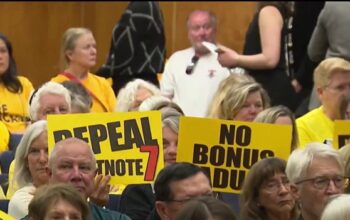Great news—Los Angeles, built on cars—is now beginning the process to outlaw cars. Soo, for the downtown area we will have congestion prices—forcing poor and middle class not to be able to afford to go to that area. The implementation of the Park Block Plan, like San Fran, is to make it difficult to get around town.
“Los Angeles officials have voted on a motion to implement the first Park Block, a pilot project that creates a car-free grid of city streets to open up public space for pedestrians and cyclists, as reported by NBC Los Angeles. The plan takes inspiration from Barcelona’s Superblock program, which creates groups of nine blocks in the district of Example and restricts the traffic to the outside streets, freeing up the rest of the streets for pedestrian and local transit only. Implemented in 2016, the plan has led to reduced levels of air pollution, urban noise and traffic fatalities. A similar program is now planned for Los Angeles, United States.
This will harm business, make it difficult for families to visit and isolate our population—which is the goal.
Los Angeles Plans to Implement the Park Block Pilot, a Car-Free Grid Inspired by Barcelona’s Superblock

- Written by Maria-Cristina Florian, Arch Daily, 8/2/23 https://www.archdaily.com/1004908/los-angeles-plans-to-implement-the-park-block-pilot-a-car-free-grid-inspired-by-barcelonas-superblock-model
Los Angeles officials have voted on a motion to implement the first Park Block, a pilot project that creates a car-free grid of city streets to open up public space for pedestrians and cyclists, as reported by NBC Los Angeles. The plan takes inspiration from Barcelona’s Superblock program, which creates groups of nine blocks in the district of Example and restricts the traffic to the outside streets, freeing up the rest of the streets for pedestrian and local transit only. Implemented in 2016, the plan has led to reduced levels of air pollution, urban noise and traffic fatalities. A similar program is now planned for Los Angeles, United States.
Barcelona’s strategy, locally called “Superilla,” has been proven effective in reducing air pollution, urban noise, and traffic-related accidents. By limiting traffic, the remaining streets are freed for other functions, resulting in a hierarchical change in the urban units, with the newly unified city blocks encouraging social cohesion and activating the adjacent public spaces. Re-naturalizing the new public spaces increases the range of advantages, with planted areas and permeable surfaces contributing to reducing the effects of urban heat islands and helping lower urban temperatures.
In Los Angeles, the program is scheduled to be implemented in León’s District 14, which includes neighborhoods such as Downtown, Boyle Heights, and Eagle Rock. The local Department of Transportation is charged with finding the exact location of the first plot, with priority being given to disadvantaged communities, as mentioned in the official Report released by the Transportation Committee.
While using the example of other successful initiatives, the Park Block Program aims to create a personalized solution adapted to the needs of Los Angeles. Consequently, priority areas have been chosen among communities “who have the least access to public space, highest health disparities, high population densities and the desire to participate in the program,” as described in the official report.
The Park Block Pilot recognizes that we need diverse uses of our streets and housing. It is a creative use of our city’s resources that creates safer, cleaner, and friendlier neighborhoods. – Eli Lipmen, executive director of Move LA
Earlier this year, Los Angeles authorities passed a policy directing that new buildings within city limits must be designed to use all-electric energy, becoming the second largest city in the United States to mandate a definitive shift from fossil fuels in new construction. Other regions around the world are also adopting legislation to improve the quality of life for their residents while also striving to mitigate the effects of the climate crisis. France has approved a new law requiring all large car parks to be covered by solar panels. Other measures are designed to address specific needs, like Barcelona’s climate shelters program or the CoolRoofs Initiative in New York City.



